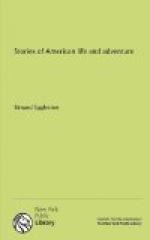George patted his rifle as though it had been an old friend, and said, “Well, old gun, whoever gets you will have to be quick.” After that his hand was always on his gun, and his eye was always on the Indians.
He asked his men where the sack of flour was.
“Old-man has it,” said one of his men.
To let the chief keep the flour was to run the risk of starving, but Northrup knew that if he took it away there might be a battle. He stepped up to the chief and took the bag of flour from his side and started away without saying a word.
[Illustration: “You shall go South!”]
“Man-that-draws-the-handcart,” said the chief angrily, “bring back my flour.”
George stopped, and opened his coat. He pointed toward his heart and said,—
“Old-man, if you want to kill me, shoot me, but you shall not take away my flour and leave me to starve.”
“Very well,” said the chief sternly, “then, Man-that-draws-the-handcart, you shall go south.”
In the language of these Indians, to go south means to die. They think the soul journeys to the southward after death. Old-man meant to say that Northrup should die.
“Very well,” said George, looking the Indian in the eye, “I will go south, then; but if I go south, you shall go with me, and just as many more as I can take. Remember, Old-man, you must go south if I do.”
Old-man knew Northrup very well. He knew that if anybody tried to kill him, George’s sure aim would be taken at Old-man first of all. George had also told all of his men to shoot the chief if there should be any trouble.
After lingering for two days, the Indians stole a bag of chopped buffalo meat, or pemmican, and an old gun. With these they went off, and George hurried away to a better camping place, where they could not find him again.
THE LAZY, LUCKY INDIAN.
Out in the country we now call North Dakota there once lived an Indian known as “Lazy-man.” When he was young, he had been lazy about hunting. When the other Indians had skins to sell, the lazy Indian had nothing. He grew poor. His blanket was ragged. His leggings were worn out. His wigwam was so wretched that all the tribe laughed at its tumble-down look.
Every winter the tribe went off to the great plains to hunt buffalo. They took their little ponies along, to carry home what they got. They brought back the skins of the buffaloes and buffalo meat dried over a fire. They also brought back pemmican, which is made by chopping buffalo meat very fine, and mixing it with the tallow from the animal. Lazy-man was ashamed to go on the hunt. He had no ponies to carry the meat and the skins he might get.
One winter, when the tribe went off on its regular hunt, Lazy-man and his wife staid behind as usual. They sat lonesome in their teepee, as a wigwam is called in their language. The weather grew colder. It was hard to find anything to eat. The lake near them was frozen, so that they could not fish. There were not many animals living in the country about. The lazy Indian and his wife were nearly starved.




